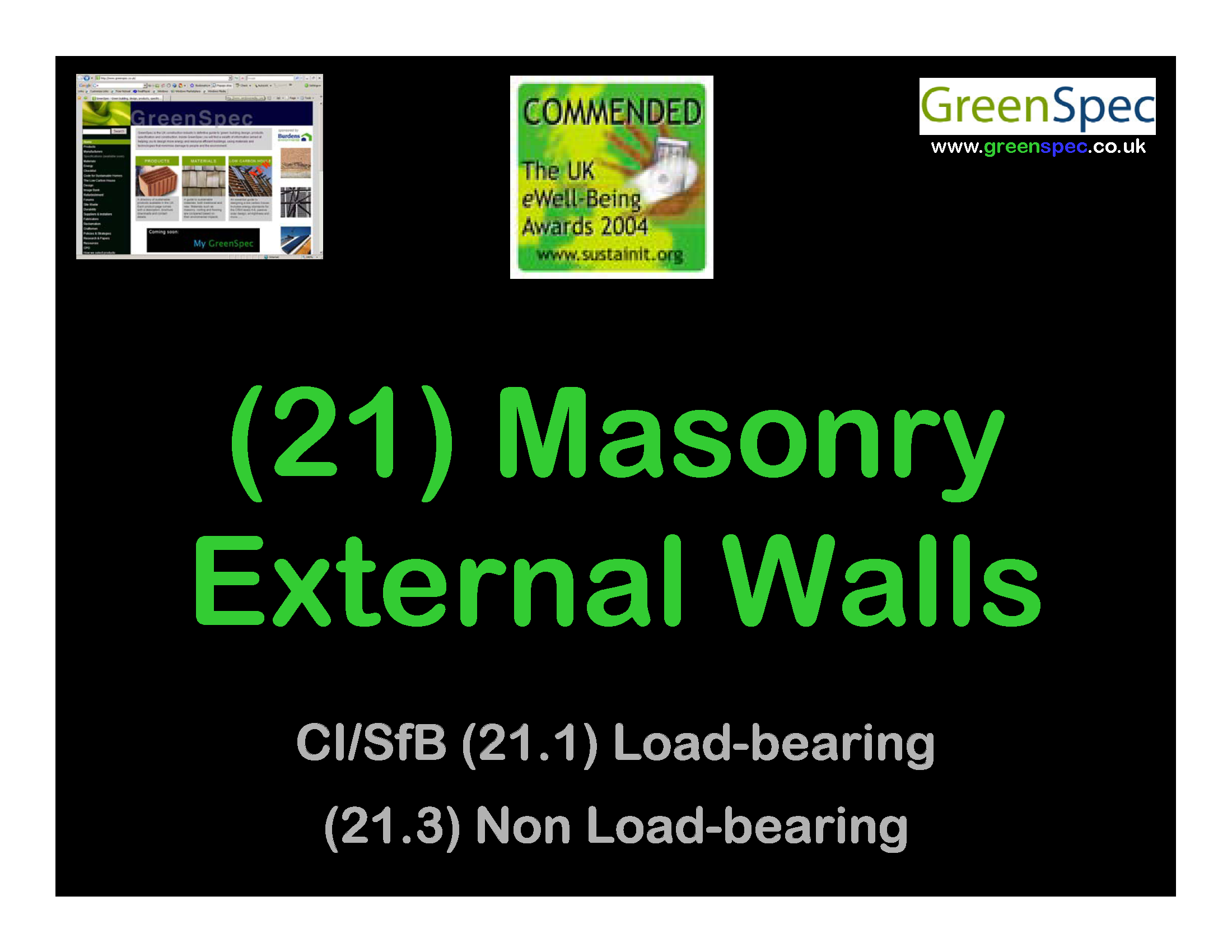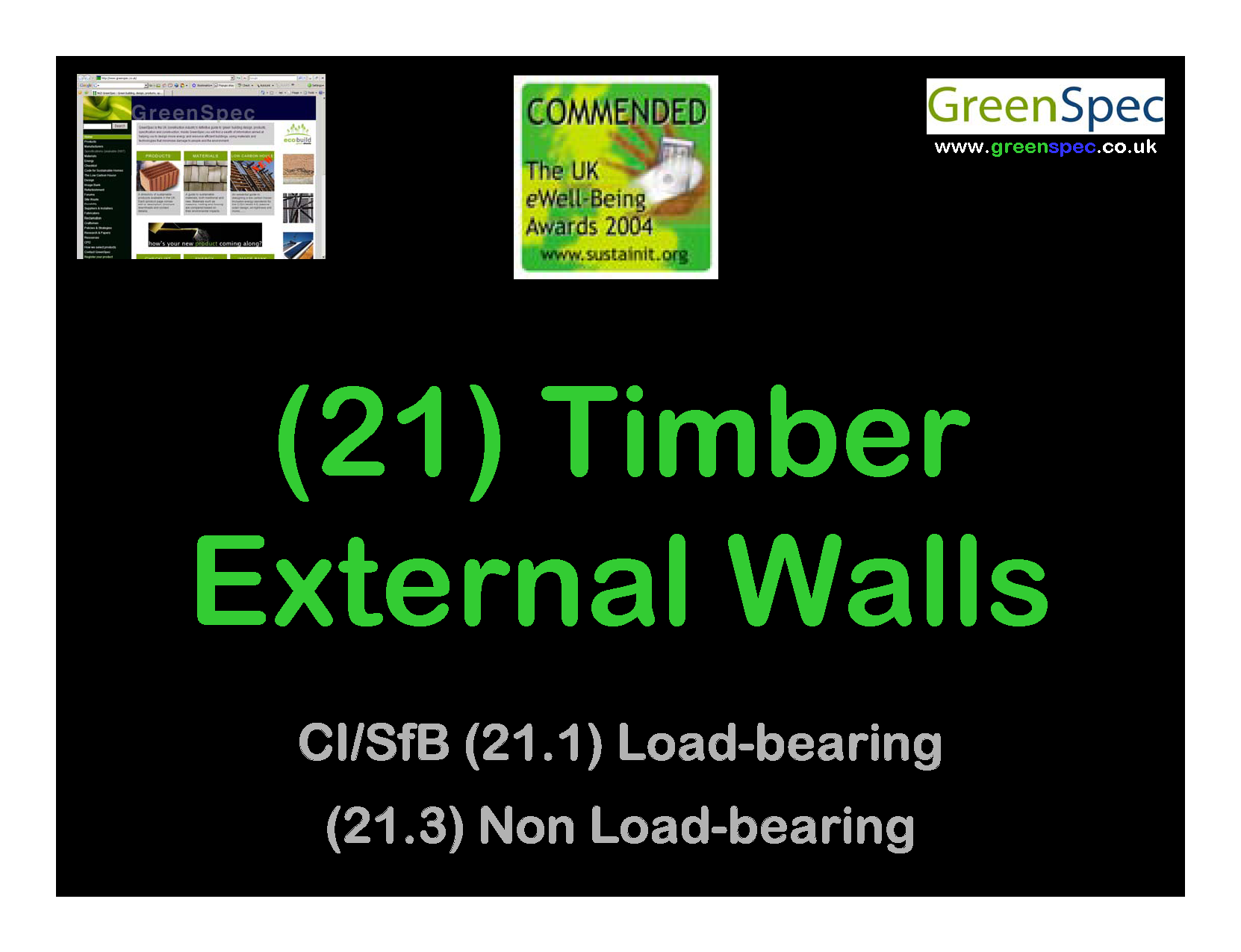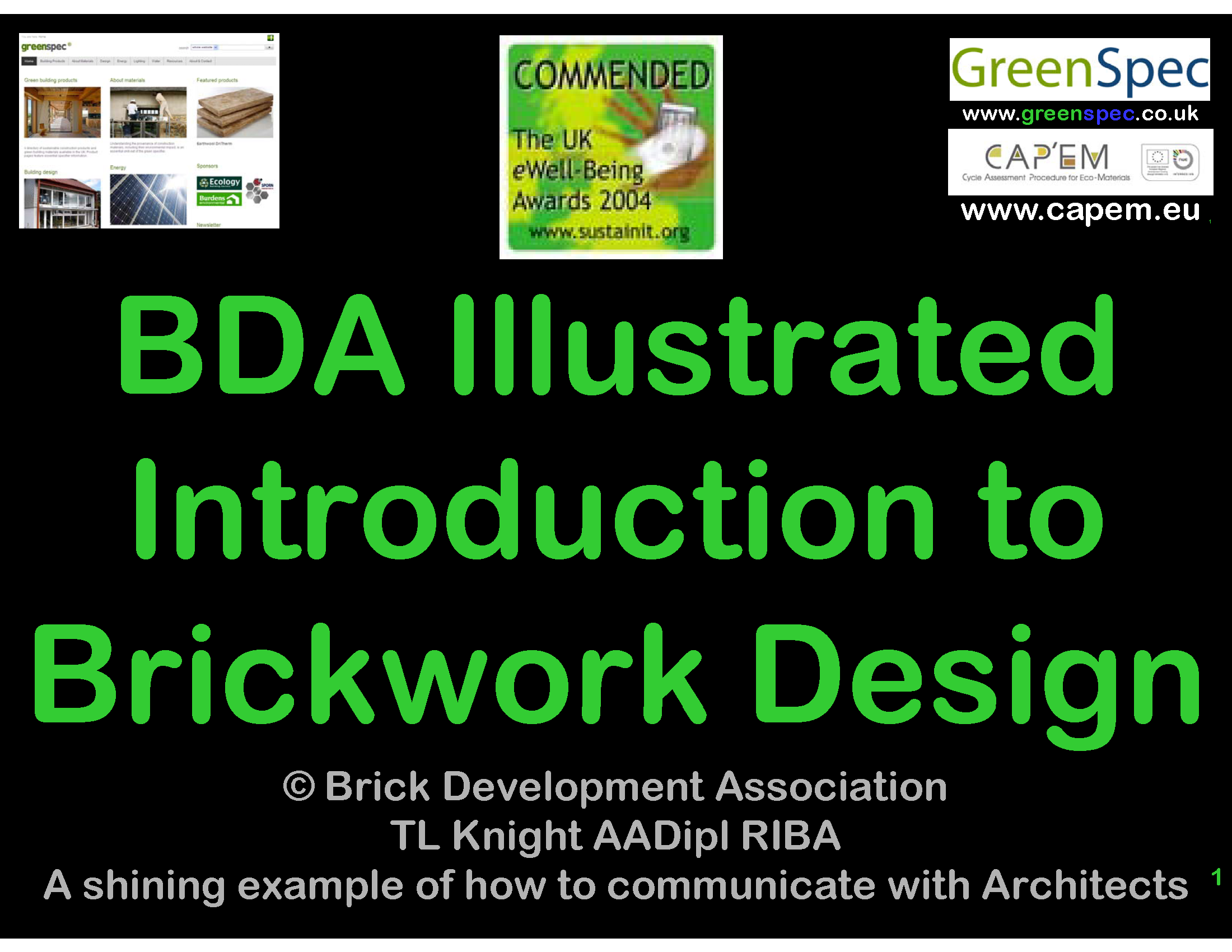Z21 Mortars Checklist
GBE > Encyclopaedia > Code > Checklist > New Build > Z > G#1648 N#1562
Z21 Mortars Checklist
Index:
Problems:
- Ordinary Portland Cement (OPC)
- 8% of world man made CO2 production is due to Cement Production
- 1.8% of UK man made CO2 production is due to Cement Production
Bad Habits:
- Everybody uses OPC without a second thought
- Everybody specifies OPC without a second thought
- Structural Engineers standard Specifications list and permit use of OPC, GGBS and blended OPC and GGBS but do not require use of GGBS or blended GGBS as a replacement for OPC.
- Brick and blockwork can easily use Cement:Lime or Lime based mortar
- Earth or Turf are also used as a replacement for mortar in wall construction, by people in the know
Solutions:
- Lime mortar in preference to OPC mortar in brickwork or blockwork
- Ground Granulated Blast Furnace (GGBS) Cement in preference to OPC mortar (If height and speed not an issue)
- Blended GGBS and OPC mortar in preference to OPC mortar (If height and speed are an issue)
- Concrete mixing plants often have 2 cement silos one for OPC the other for GGBS
- They will blend OPC and GGBS to permitted limits that the mortar will set and harden like OPC mortar
- GGBS is cheaper than OPC
- GGBS is creamy coloured grey OPC is cold grey in colour, this affects the colour of the mortar
- BREEAM can drive the use of GGBS and blended cements
- Carbon Counting will drive the use of GGBS and blended cements
- Substitution needs to be managed proactively to ensure less OPC is used.
Misunderstandings:
- The cement sector may recommend stronger cement mortar
- Stronger is not always best:
- uses more high energy consuming and high CO2 generating materials than necessary
- stronger mortar in facing brickwork, blockwork or stonework puts the brick, block or stone at risk of frost damage
- always use a weaker mix in vulnerable materials
- stronger mortar prevents reclaiming of bricks and blocks
Use:
- Lime mortar in preference to OPC mortar
- Blended GGBS and OPC cement mortar in preference to OPC mortar
- Cement made from other than limestone
Consider:
- Cement substitution to reduce OPC cement content
- Preferred alternatives to Ordinary Portland Cement (OPC):
- Lime mortars
- Portland Blast Furnace Cement (PBF)
- Portland Pulverised Fuel Ash Cement (PFA)
- Ground Granulated Blast Furnace Slag cement (GGBS)
- OPC replacement by GGBS or PFA cements
- Lime based mortar and reclaim of blocks for reuse, which requires tough blocks
Avoid:
- Use of cement mortar: cement production generates high levels of CO2
- See E10
- Chasing brickwork and blockwork to run buried conduits, a very dirty job making the building a no-go area whilst in progress
- Filling conduit chases using cement based mortar/render
Minimise:
- Use of OPC mortar
Substitute:
- GGBS for OPC to the maximum % permitted by Codes of Practice
Health:
- OPC and lime is alkali and bad for skin and eyes
- OPC is very fine avoid breathing into lungs
- Wear protective clothing and gloves and goggles when using Lime
Wellbeing:
Biodiversity:
- Use of turf or earth in place of cement or lime mortar in hedge bank walling provides a way for nature to inhabit walls
- Using no mortar in place of cement or lime mortar in dry stone walling provides a way for nature to inhabit the interstices in walls
Safety:
- Wear protective clothing, gloves and goggles when using Lime
Precautionary principle:
Resource Efficiency Issues:
- Design For Demount ability:
- Thick blockwork walls used with external insulated render could be laid in lime mortar to encourage the possibility to reuse them at the end of the buildings life
- Site walls made of solid brickwork could be laid in lime mortar to encourage reuse of bricks
Reduce:
- Mortar use by using thin joint blockwork
Reclaim:
- Reclaimed Bricks originally laid in lime mortar
Reuse:
- Reuse reclaimed bricks using lime mortar to allow further reuse
Recycle:
- Lime mortar can be recycled
- Cement mortared brick and blockwork, crushed as hardcore, brown roof gravels, pavement sub-base, permeable pavement or piling mat
Recover:
Waste Issues:
- Cement mortar once gone off is likely to be inert
- Lime mortar is not inert until completely hydrated which can take a long time if bulky
Hazardous waste & Deleterious Substances
- Lime mortar is potentially hazardous until gone off and then inert, but landfill heat could reactivate its capacity to react with water and rehydrate
Waste statistics:
Waste minimization:
- Buckets of mortar delivered to sight can lead to waste if great care is not taking in ordering sufficient and not excess to requirements.
- Using set-retarders in the mortar mix might help to avoid waste
- Set retarders introduce more chemicals, see if they can be avoided
End of Life options:
- Use lime mortar to enable reclamation of bricks and blocks
Appropriateness:
- GGBS cements work well with recycled glass aggregates
- ASR Alkali Silica Reaction can occur between recycled glass aggregates and OPC cement
Competence:
Effectiveness:
- Drive down carbon by replacing significant percentages of OPC from any mix
Yardstick:
Maintenance issue:
- Lime mortar pointing is easier to do than cement mortar pointing
- Do not replace live mortar with cement mortar pointing
- Mortar should always be weaker than the stones or bricks in the wall
Industry/Sector Initiatives:
- We detect the OPC manufacturers have finally understood that the GGBS manufacturers are not their enemy but potential collaborative partners in driving down Carbon in concrete, mortar and screed
Information sources:
- The Whole House Book (Pat Borer and Cindy Harris) page 115
© GBE GBC GBL NGS ASWS Brian Murphy aka BrianSpecMan **
19th November 2018 – 7th September 2021
Z21 Mortars Checklist
Images:
Fig. 1 BDA Introduction to Brickwork Design

Fig. 2 (21) Masonry External Walls

Fig. 3 (21) Timber External Walls
Often have brick outer leaf
© GBE GBC GBL NGS ASWS Brian Murphy aka BrianSpecMan **
19th September 2014 – 7th September 2021
Z21 Mortars Checklist
See Also:
GBE Checklist
CAWS Abbreviations
- E
- E10
- E41
- F10
- F30
- M10
- M20
- M21
- Z21 (this page)
CAWS Work section titles
- E In situ concrete/Large precast concrete (Checklist) G#649 N#671
- E10 Mixing/Casting/Curing Insitu Concrete (Checklist)
- E41 Worked Finishes to Concrete (Checklist) G#723 N#745
- F10 Brick/Block Walling (Checklist) G#1647 N#1561
- F23 Stone/Soil/Turf/Hedging Hedge Bank Walling (Checklist) G#1611 N#1538
- F30 Accessories/Sundry items for brick/block/stone walling
- M10 Cement:Sand/Concrete screeds toppings
- M20 Plastered/Rendered/Roughcast coatings
- M21 Insulation With Rendered Finish (Checklist) G#9442
- Z21 Mortar (Checklist) (this page)
GBE Jargon Buster
CAWS Abbreviations
- E10
- F10
- F30
- M10
- M20
- Z21
CAWS Work section titles
- Mixing/Casting/Curing Insitu Concrete (E10)
- Brick/Block Walling (F10)
- Hedge bank Walling (F23)
- Accessories/Sundry items for brick/block/stone walling (F30)
- Cement:Sand/Concrete screeds toppings (M10)
- Plastered/Rendered/Roughcast coatings (M20)
- Mortar (Z21)
GBE CPD
- Brick Development Association Publication
- BDA Illustrated Guide to Brickwork Design (CPD) N#238
- GBE Carbon Counting Calculators (CPD) G#39145
- F23 Stone/Soil/Turf/Hedging Hedge Bank Walling (Checklist) G#1611 N#1538
GBE Blog
- F23 Boulder and Turf Hedge Bank Walling (Blog) G#1613 N#1540
GBE Links
- Organisation/Website
- BDA
GBE Manufacturers
- Ecocem Ireland Ltd. N#1239
GBE Products
GBE Materials
- Lime
- GGBS Cement in Silos
- Blended GGBS & OPC Cement in 25 kg bags
GBE Systems
- Brickwork
- Blockwork
GBE Elemental Assemblies
- External walls
- Internal walls
- Compartment Walls
- Party Walls
- Garden walls
- Landscape retaining walls
- Hedge bank walls
GBE Suppliers
- Order blended GGBS & OPC or GGBS from:
- Travis Perkins SBS N#1241
- Delivery Direct from:
- Ecocem Ireland Ltd. N#1239
- in 25 kg bags or Silos
GBE Calculator
- WasteCost® Lite waste calculator
- GBC Green Building Calculator (Navigation) G#38828
GBE Satellite Websites
GBE CAD
GBS Green Building Specification
- F10 BRICK/BLOCK WALLING
- F23 Boulder and Turf hedge bank walling (RSW) G#1612 N#1539
- F30 ACCESSORIES
- Z21 MORTAR
GBE Projects
- Oriel y Parc St Davids Gallery (Case Study) G#1669 N#1576
© GBE GBC GBL NGS ASWS Brian Murphy aka BrianSpecMan **
19th September 2014 – 7th September 2021


